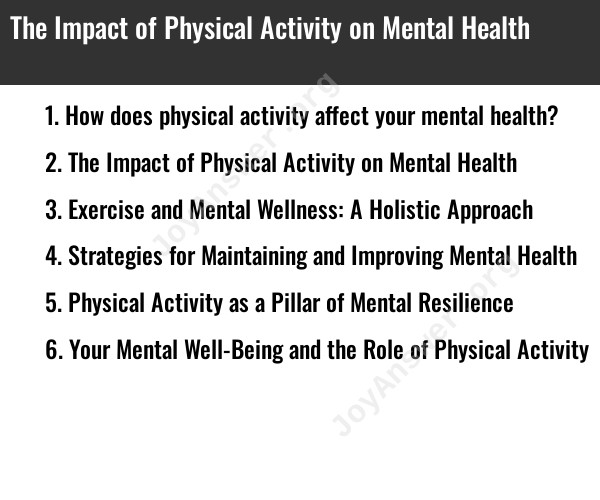How does physical activity affect your mental health?
Physical activity has a profound impact on mental health, and the relationship between exercise and well-being is well-documented. Here are some of the ways in which physical activity affects mental health:
Reduces Stress: Physical activity triggers the release of endorphins, which are natural mood lifters. Exercise also reduces the production of stress hormones like cortisol, helping to alleviate feelings of stress and anxiety.
Improves Mood: Regular physical activity can enhance your overall mood and increase feelings of happiness. It can be particularly effective in combating mild to moderate depression.
Enhances Sleep: Engaging in regular physical activity can improve the quality of your sleep, which is essential for maintaining good mental health. Better sleep can lead to reduced irritability and enhanced mood.
Boosts Self-Esteem: Accomplishing fitness goals and experiencing physical improvements can boost self-esteem and self-confidence, leading to improved mental well-being.
Enhances Cognitive Function: Exercise has been shown to enhance cognitive functions, including memory and the ability to concentrate. These benefits can contribute to better mental clarity and function.
Reduces Anxiety: Physical activity can help alleviate symptoms of anxiety. The relaxation effects of exercise, combined with improved self-esteem and body image, can reduce anxiety levels.
Promotes Social Interaction: Many forms of physical activity, such as group sports or fitness classes, encourage social interaction. Social support and the sense of belonging can have positive effects on mental health.
Reduces the Risk of Mental Health Disorders: Regular physical activity has been linked to a reduced risk of developing various mental health disorders, including depression, anxiety, and cognitive decline.
Stress Resilience: Regular exercise can increase your stress resilience. It helps the body and mind adapt to stressors and cope more effectively.
Fosters Mind-Body Connection: Engaging in physical activity encourages a greater awareness of your body and the ability to connect with your physical self. This can promote mindfulness and emotional well-being.
Natural Antidepressant: Exercise has been described as a natural antidepressant. For some individuals, regular physical activity can be as effective as medication for managing depression.
Reduces the Risk of Dementia: Physical activity has been associated with a reduced risk of cognitive decline and conditions like Alzheimer's disease, which can have a significant impact on mental health in later life.
Emotional Regulation: Exercise can help in regulating emotions and managing mood swings, especially in individuals with mood disorders.
It's important to note that the relationship between physical activity and mental health is complex, and the effects can vary among individuals. The type, intensity, and duration of exercise that work best may differ from person to person. It's also essential to consider individual physical limitations and to choose activities that are safe and enjoyable.
Incorporating regular physical activity into your routine, even in the form of daily walks, can be a powerful strategy for improving and maintaining good mental health. If you are dealing with mental health challenges, it's advisable to consult with a healthcare professional, who can provide guidance on how to integrate exercise into your treatment plan.
The Impact of Physical Activity on Mental Health
Physical activity has a significant impact on mental health. It can help to reduce stress, improve mood, boost self-esteem, and promote relaxation. Exercise can also help to improve sleep quality and cognitive function.
There are a number of different ways that physical activity can improve mental health. One way is by releasing endorphins, which have mood-boosting effects. Exercise can also help to reduce stress hormones, such as cortisol. Additionally, exercise can provide a sense of accomplishment and boost self-esteem.
Exercise and Mental Wellness: A Holistic Approach
Exercise is an important part of a holistic approach to mental wellness. It should be combined with other healthy lifestyle habits, such as eating a balanced diet and getting enough sleep. Exercise can also be used in conjunction with other mental health treatments, such as therapy and medication.
Strategies for Maintaining and Improving Mental Health
Here are some strategies for maintaining and improving mental health through physical activity:
- Aim for at least 30 minutes of moderate-intensity exercise most days of the week.
- Choose activities that you enjoy and that fit into your lifestyle.
- Find a workout buddy or join a fitness class to increase motivation and accountability.
- Set realistic goals and track your progress.
- Gradually increase the intensity and duration of your workouts over time.
- Listen to your body and take breaks when needed.
Physical Activity as a Pillar of Mental Resilience
Physical activity can help to build mental resilience, which is the ability to cope with stress and adversity. When we exercise regularly, we are training our bodies and minds to be more resilient. This can help us to better manage stress, anxiety, and depression.
Your Mental Well-Being and the Role of Physical Activity
Physical activity is an important part of maintaining and improving mental well-being. It can help to reduce stress, improve mood, boost self-esteem, and promote relaxation. Exercise can also help to improve sleep quality and cognitive function.
If you are struggling with your mental health, talk to your doctor. They can help you to develop a plan that includes physical activity and other healthy lifestyle habits.













